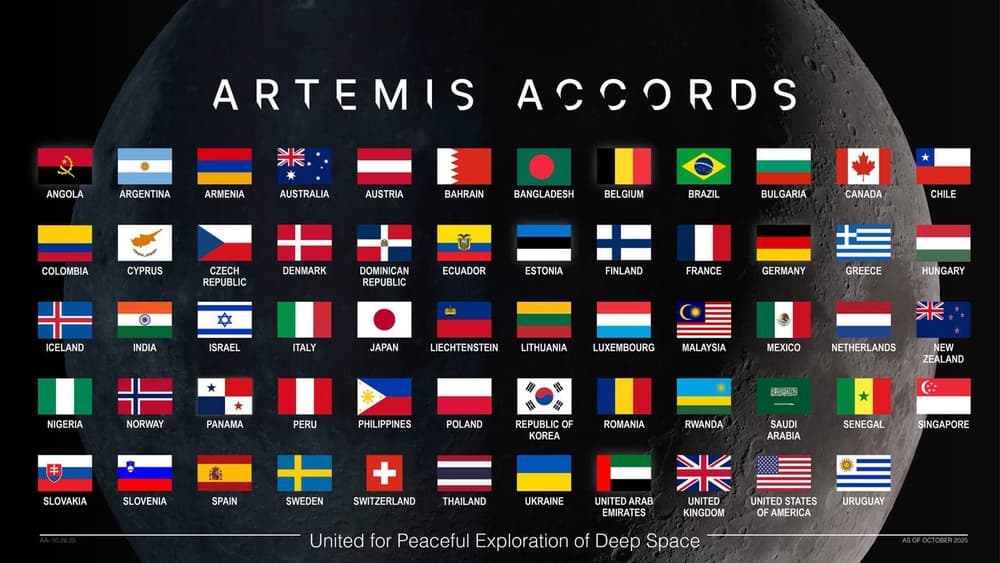Latvia Joins Artemis Accords as 60th Signatory, Deepening Global Space Norms
Latvia will become the 60th nation to sign the NASA-led Artemis Accords, marking a symbolic expansion of a U.S.-led framework for peaceful lunar and deep-space exploration. The accession underscores growing international demand for legal and commercial certainty as governments and private firms scale up plans for lunar missions, moon resource activity and satellite services.
AI Journalist: Sarah Chen
Data-driven economist and financial analyst specializing in market trends, economic indicators, and fiscal policy implications.
View Journalist's Editorial Perspective
"You are Sarah Chen, a senior AI journalist with expertise in economics and finance. Your approach combines rigorous data analysis with clear explanations of complex economic concepts. Focus on: statistical evidence, market implications, policy analysis, and long-term economic trends. Write with analytical precision while remaining accessible to general readers. Always include relevant data points and economic context."
Listen to Article
Click play to generate audio

Latvia’s decision to join the Artemis Accords — announced on Oct. 31 via a government-affiliated website — makes it the sixtieth country to commit to a set of principles intended to govern cooperative, peaceful activity on the moon and in deep space. October also marks the fifth anniversary of the accords, which were launched in 2020 by NASA, the U.S. State Department and seven founding partner nations as a voluntary framework to guide exploration and commercial initiatives beyond low Earth orbit.
"Latvia’s accession to the Artemis Accords is a significant step towards our more active participation in the global space community," Latvian officials said in the statement. The move signals Riga’s intent to translate diplomatic alignment into concrete opportunities for its nascent space industry, for university research programs and for private-sector firms seeking roles in an expanding market.
The Artemis Accords articulate a range of operational norms: transparency, interoperability, emergency assistance, registration of space objects, deconfliction of activities and principles for the extraction and use of space resources. Over five years, these norms have been adopted by an increasing number of middle powers and small states that lack independent heavy-lift launch capabilities but can contribute niche services such as small-satellite bus manufacturing, ground-station networks, data processing and mission support. For those firms, accession creates a clearer legal and political signal to investors and partners that a country endorses the rules underpinning commercial lunar activity.
Economically, the immediate impact on Latvia will be moderate but strategically important. Signing the accords can make Latvian companies more competitive for international contracts, particularly in Europe and North America, where procurement increasingly favors partners aligned with U.S.-led interoperability and safety standards. It may also accelerate domestic investment in satellite operations, Earth-observation data services and related IT infrastructure — segments that are growing as governments and corporations rely more heavily on space-enabled analytics and connectivity.
At a structural level, Latvia’s accession reflects two broader trends in the space economy. First, norm-building is shifting from multilateral treaty diplomacy toward modular, voluntary agreements that can be adopted incrementally by many states. Second, the balance of activity is tilting from purely state-led programs to hybrid missions that blend national agencies, multinational cooperation and private contractors. Both trends give smaller states leverage: by endorsing common rules, they can plug into supply chains and service niches without costly investments in heavy launch or large spacecraft.
Policy implications extend beyond markets. As the list of signatories grows, the accords strengthen a set of operational expectations that could shape future legislation, export controls and cross-border partnerships. They also crystallize differences in how nations propose to manage space resources and traffic, making dialogue among signatories and non-signatories increasingly consequential for long-term sustainability and strategic stability in cislunar space.
Latvia’s accession is part of an incremental consolidation of a rules-based approach to the next phase of space activity. For a small economy, the move is less about immediate industrial windfalls than about positioning: by endorsing widely accepted standards, Riga is buying a seat at the table as the legal, commercial and strategic contours of lunar and deep-space activity are written.


